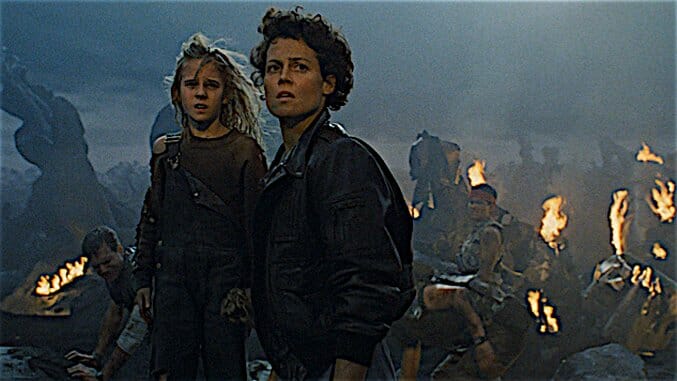30 Years of Aliens: A Love Story

Movies have a funny way of staying with you. The right movie at the right time can make a memory so strong that it forms a little piece of who you are. The same can be said of all media, of course—books, comics, a TV show or music—but movies have always been especially important to me.
In case it wasn’t obvious from the title, James Cameron’s Aliens was one of those pieces for me. In 1986, I was somewhere between 12 and 13. The entire year had been awful for everyone. My mom and sister were both in and out of the hospital for health problems, and I was pretty much ignored most of the time because everyone was constantly in crisis mode.
But this one day, on the way to a scheduled hospital stay, my parents, undoubtedly burned out from the stress, decided to take a break and take us to the movies. My dad and I were both huge science fiction and action fans. One of my earliest memories is going to see Star Wars with him in ’77 or ’78 (it came back to theaters a few times back then). Dad was also really into reading and watching film critics, and Aliens had gotten raves from Siskel and Ebert, which instantly put it on his must-see list.
Aliens was the first R-rated movie I’d ever seen. I wish I could remember my at-the-moment emotions during the film, but it was 30 years ago. I do, however, know the effect it had. Aliens, in comparison to anything else I’d seen (even Star Wars), was a revelation. The pacing of the relatively simple plot was breakneck and intense. The creatures were astounding (and still are), and the human characters were flawed, emotional, and mostly disposable.
The ideal of the space marine, though owing much to Robert Heinlein’s Starship Troopers, was almost single-handedly formed in the minds of filmgoers by Aliens. Cameron, clearly influenced by much older war movies and, perhaps especially, Apocalypse Now, took time in the first act to make sure we knew all these soon-to-be chewy morsels before the nightmare started.
Paul Reiser, as Burke, was an especially interesting character. The evil company man is a hackneyed cliché now, but Aliens is the reason you see this character so much. I’d only seen Reiser as a comedian, but he was perfect in the role—shallow and friendly, with a rotten core. He was as much a villain as the creatures and seeing humans in such an unfavorable light even compared to the monsters was something very new to me.
-

-

-

-

-

-

-

-

-

-

-

-

-

-

-

-

-

-

-

-

-

-

-

-

-

-

-

-

-

-

-

-

-

-

-

-

-

-

-

-








































